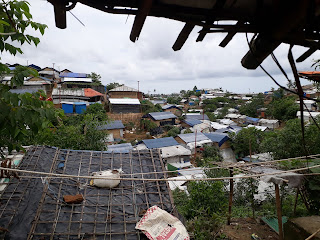
Sprawling, overcrowded squalor… was what came to my mind as I entered Kutupalong camp in Cox's Bazar District in Bangladesh, the largest refugee camp in the world, where over a million Rohingya refugees are forced to reside, the majority since 2017. They fled the violence in their homeland, Myanmar, where decades of discrimination and violence against the Rohingya ethnic group of Rakhine state, led to atrocities perpetuated against them by the Burmese army. Their homes were burnt, their women were raped, their relatives killed and so they fled; an orchestrated genocide by the Burmese government, no doubt.
In July 2017,
700,000 ethnic Rohingya walked for 7 days, across the border to Bangladesh,
where other Rohingya refugees had settled decades earlier, also victims of
violence and discrimination.
Two years later,
in July 2019, I sat with fifteen Rohingya men, in a small plastic temporary
shelter, evaluating a protection project, as an international consultant…
“They raped our
women in front of us”, a gentle faced middle aged Rohingya refugee told me, his
voice quivering. My translator, a Rohingya activist, struggled to say the word
rape in English. Next to him, other men asking questions, all wanting answers
that I could not give. “When will we be able to return to our country?” another
one asked, frustration in his voice. “When will Myanmar grant us citizenship?”
Beads of sweat
formed on everyone’s foreheads as the heat and humidity in the tiny refugee
shelter, became nearly unbearable. A younger man spoke out, in very good
English: “If I had known our fate in this refugee camp for two years, I would
have stayed in my village and face death in the hands of the Burmese army”.
Overwhelmed by what I had just heard, I repeated his sentence in my head a few
times and holding back tears, I came to a realization that human dignity was as
important as food and water; human dignity which these Rohingya refugees had
completely lost.
As I walked
around the different sections of this enormous camp, I saw little children, run
freely, unsupervised. Young girls shied away as I smiled at them and huge NGO
cars frenzied by delivering essential aid to the vulnerable. Bustling markets
had sprung up in every part of the camp since their arrival here, no fence, no
checkpoints barring entry to outsiders…
“Smugglers come
and traffick our girls and women”, my Rohingya activist friend told me as we
walked by the oldest part of the camp, the part which housed the “first
arrivals". “Bangladeshi criminals smuggle drugs and medicine through
here”, he sighed; the lines on his forehead, showing his anxiety. Poverty and
exclusion has driven many Rohingya youths to crime which has resulted in
soaring tensions within the Rohingya refugee community.
The majority of
the refugees living here experience post-traumatic stress from the horrors they
suffered when they fled. They have no rights and no citizenship. The
Bangladeshi Government has borne the brunt of hosting a million refugees where
the expansion and settlement of the camps has caused such environmental, social
and economic stress on the area, that Bangladesh is now desperate for a
solution.
While this host
country is neither a signatory to the 1951 Convention relating to the Status of
Refugees nor to its 1967 Protocol and has not enacted any national legislation
on asylum and refugee matters, it has however acceded to several of the
existing international rights Covenants and Conventions and therefore does
recognize a body of international law which provides a framework for protecting
refugees. But does this suffice?
After two failed
attempts at repatriating a large number of refugees this year, Bangladesh’s
desperation has translated into harsh measures, which are currently taking
their toll on the Rohingya population. “The situation here is dire and
terrible”, the activist told me today after trying to get in touch with me for
the past two days due to restricted access to the internet.
Refugees have
been denied access to mobile phone networks, markets have been closed, micro
and small businesses prevented from operating. Patients in the clinics in the
camps are dying due to lack of medicine and medical supplies. NGOs and the UN
are prohibited from recruiting Rohingya refugees and they are restricted in
their movements. The emergency appeal is 30% funded with donor support
dwindling further. Children are being denied an education and forced to endure
hardships, no child should ever have to endure.
The Government of
Myanmar and its army are responsible for this genocide. Myanmar is the
perpetrator of crimes against humanity and it needs to be held accountable for
its crimes. Myanmar should ensure the safe return of Rohingya refugees assisted
by a UN peacekeeping force and grant them full citizenship with access to
rights and access to services and political participation.
“Help us, we
don’t have a voice”, was the last sentence my Rohingya activist friend said to
me before the line was cut off…